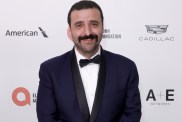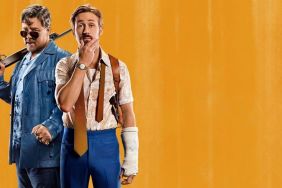Russell Crowe isn’t known for doing comedy, but maybe he should start. At the press conference for Warner Bros.’ new thriller Body of Lies, directed by Ridley Scott and co-starring Leonardo DiCaprio, Crowe was quite the jokester throughout the entire interview. He was the first to arrive and although seats were already selected for the stars with name plates, he changed the seating arrangement to his liking and made fun of his co-star for being late.
“Who wants to play the role of Leonardo DiCaprio? (looking at one of the journalists) Sorry, no. Young man? There you go, Leo would wear that color. Leo and Bill [Monahan], where’s Leo and Bill. (Changes voice to an announcer) Hello, Leo and Bill, hello. Could Leo and Bill come to the press conference please? Actually, if we’re quick, just ask us a couple of questions, we’ll piss off and then you can have the rest of the time with Leo and Bill. Bargain?”
The film is based on the New York Times best-seller with the same title written by David Ignatius, a prize-winning columnist for The Washington Post.
The story centers around Roger Ferris (DiCaprio), a CIA agent who learns how dangerous the truth can when he becomes involved in an operation that takes him around the globe and pairs him up with CIA veteran Ed Hoffman (Crowe). The mission ends up being the most perilous and risky situation he’s ever faced and he’s got to do anything it takes to stay alive.
Q: What was it like working with Leo again after so many years?
Russell Crowe: Oh yeah, have I got some stories for you. It was the same as it was working with Leo in 1993, easy, easy and fun.
Q: A lot of your scenes in this film are you and your cell phone essentially, was that like doing a voice on a cartoon?
Crowe: I don’t know I’ve never done a voice on a cartoon. It’s the same as if you’re doing a CGI film and you’re supposed to be floating in a flock of black ravens; in fact most of the time when you’re on a film set what you see in the audience has nothing to do with the experience of the actor. So you’ve always got to be shutting off things that are going to affect your focus and all that sort of stuff. So it’s the same sort of thing where you just zero in on the phone call. Some guys try to attempt to do that thing of having both people on the phone at the same time, which is just utterly a waste of time, it’s a waste of time, it’s better off that you just do the groove by yourself. And then the next person, if you shot it first, the next person gets to hear where you were and so they will fold into that, or if you’re doing it second it’s the same thing, you listen to what they said and then you have a think about it.
Ridley Scott: If you’re the director you got to go out and if somebody’s done it first, and I run it, then the other actor will say, “Christ, he’s taking forever to say his dialogue.” So it’s always better on your own.
Crowe: What was that? (Leo arrives – To Leo) You did a costume change too.
Leonardo DiCaprio: I did.
Crowe: You went more formal, I went less formal.
DiCaprio: You did?
Crowe: It’s the afternoon, man, let’s chill out, they’ve all been drinking now.
Q: Are the characters in the film close to the characters in the book?
DiCaprio: To put it simply I saw my character as an operator in the middle-east that was trying to operate and do his job in the higher moral context that his boss wanted him to, and there was this great conflict that was set up in the book and adapted by Bill [Monahan] into this script of this dilemma that this character has where he’s asked consistently to do things that he doesn’t believe in for the betterment of his country and this war on terror. And he simultaneously is accustomed to the middle-east and their cultures and he meets up with this Jordanian intelligence officer who he grows to respect, and wants to do the best job he possibly can, but he’s being manipulated by both sides. And besides this being a great political piece that’s pertinent to this time, it was this fantastic cat-and-mouse espionage thriller that works on its own.

Crowe: Fantastic answer Leo, thank you.
DiCaprio: Thank you, thank you.
Crowe: I always believe it’s nice to be polite at a press conference. The first thing that I got was a phone call from Ridley saying, “How would you like to put on a large amount of weight?” And that always appeals to me, and so that was kind of like a sell right there. But one of the other things that he said is that he wanted the character to feel like an ex-football player with bad knees who still had some grace about him, so that was also interesting. Everything else comes from the book and the way the character talks in the book, the dialogue in the book.
Q: Was it for you that you had such a great relationship with Ridley that you would do pretty much anything that he wants you to do?
Crowe: I went through a period of time where even after the great relationship we had on “Gladiator,” I didn’t fully realize that that was probably a unique situation that will come along in your performance life, and so we went through a thing where he asked me to do “Black Hawk Down,” but I’d just done a movie where there was a helicopter in the background and I wasn’t interested, then he wanted me to do “Kingdom of Heaven,” but I was in the middle of doing something else, and I said, ‘Oh you’ll have to wait a year,’ and he said, ‘F**k off, who are you?’
DiCaprio: That was a great impersonation.
Crowe: With the last three things we’ve done together it’s basically, “Right, this is what we’re doing,” and I’m like, “Okay, cool,” and I’ll say yes first with him and then work out why I want to do it afterwards.
Q: Leo, you did most of your own stunts.
DiCaprio: Most of, yes.
Crowe: I’ll give you an example of most of his stunts. (pretends to dial a phone)
DiCaprio: That I didn’t do, I didn’t do any dialing, I refused. We got beautiful hand doubles we got for this movie.
Scott: He doesn’t like dogs either.
Q: Were there any stunts that were challenging or painful, and you had to learn some Arabic, are you able to remember any of that.
DiCaprio: Absolutely none, I can’t remember a single word even to tell you the truth. But we had an Arabic coach there that was really helpful, because it was more so than any accent, you have to be so exact and there’s different dialects of Arabic from country to country, so it was really, really difficult to tell you the truth. And one of the hardest things I’ve ever had to do language-wise, because it comes from the throat, it’s different, and also learning about the customs and the culture and all that, so we had advisors for that sort of thing, and as far as the stunts were concerned, yeah, it was difficult, it was a very, very difficult shoot, but that’s the nature of working on a Ridley Scott movie, you have to embrace that. The pace in which he shoots is really intense, really fast paced, and you have to be prepared for anything in any given moment. He literally has helicopters on standby circling around, ready to get an overhead shot of you running through an entire city, and he’s like, “Alright, you’re happy with the scene, great, you’ve got your dramatic beats, okay. Why don’t you walk down the block and we’re going to have three helicopters chase you through an Arabic street in real time, they’ve blocked off some traffic, but you’ll be fine, it’ll be great, go ahead.” And you have to just be prepared for that. And that was the biggest adjustment, I’d just come from this other movie called “Revolutionary Road,” where it was like doing a 1950’s play, where we are talking about our feelings for months at a time in a small room, and then I wound up in Morocco with missiles being shot at me, it was a bizarre transition, but once you get accustomed to that pace you embrace it and you enjoy it and it starts to become this adrenaline-fueled work environment that you love.
Q: Did that building really blow up behind you?
DiCaprio: What building?
DiCaprio: Right at the beginning.

Crowe: Oh, you didn’t notice it got blown up behind you?
DiCaprio: I didn’t notice that part.
Crowe: By the time you turned around it wasn’t there anymore.
DiCaprio: I haven’t even seen this movie, I don’t even know what you’re talking about. What building?
Scott: The shepherd’s stone house, yeah that was blown up.
DiCaprio: Oh yes, yes, that was a big explosion. (everyone laughs)
Crowe: The key for any young player if they want to go and work with Ridley, you have to be prepared to bleed. It’s as simple as that.
Q: You two as actors and performers in this film look like you’re at either end of the spectrum, Russell you look like you’re having the time of your life, and Leo, you look like you’re a guy in the middle of the worst day of his life – how was that a challenge for each of you to come at that differently?
Crowe: I definitely was having the time of my life, because I knew that ultimately I’d be out of there in five weeks, it wasn’t going to be my responsibility, somebody else was going to get blown up this time and I was perfectly happy with all that.
DiCaprio: I didn’t want to say that, but I think the nature of the environments kind of played a toll in those [performances] – to tell you the truth, we were there for three and a half extra months, even thinking back – you enjoy this stuff.
Scott: I do, I like the place.
DiCaprio: People always ask, “Was it fun? Was it fun working on that movie?” I don’t know if that’s the operative word, it was challenging and interesting and all those other things, but fun isn’t always the operative word.
Q: Russell and Leo, did either of you do any research in regard to the CIA in terms of CIA protocol…
Crowe: We can’t discuss that with you.
DiCaprio: I got to talk to some people who worked in that field. It’s a very interesting subject matter to take on. Unless you’re talking about the CIA in the general context of history, what they’ve done historically which we’re only now starting to learn about the basis of it being able to operate is the fact that it’s shrouded in secrecy. Otherwise it wouldn’t be able to function. So there’s a certain leap of faith that you take with all this stuff. It was really David [Ignatius]’s research that he did in the Middle East, talking to Jordanian intelligence and all of that stuff that Bill [Monahan] then adapted and did the screenplay that takes on a life of its own. But we did the best research that we could in that regard. Yes. No. I don’t know.
Q: Leo being in danger while Russell is picking up his kids – is it a commentary on the larger world about where the insulation goes?
Scott: It’s a comment on cell phones when he’s about to engage in the field. He gets a call from his lawyer saying (his ex) wants the house. You’ve got to go, who wants the house? Then you realize he’s engaged in a private condition, which is getting divorced back in Washington. That’s what can happen today. The access to everything and instant information to everything has changed the world.
Q: Insulation affects their work?
Scott: Isn’t that always the way? It’s the desk paratrooper up front who says Montgomery, Patton, Napoleon, who the great generals in the field were saying, if we put this quarter of a million troops over here, it’ll get wiped out but we’ll have a million safe over here. What’s the right decision? You’ve got to make a choice. The guy who’s running one of the black ops of the CIA, he’s in a box that’s even more secret than the CIA, he said, independent functionary, it’s the least staff as possible. Put as few people as possible because the more people that know the more likely it is that you’re gonna get a leak. So he’s a freewheeling independent functioning within the CIA. In the field he may not have a lot of guys the level of Farris, he may only have a dozen and he may choose to have them all together, and Farris may not know if there’s another functionary there on his beat because he chooses not to talk about it. That’s why there’s an oops when somebody shouldn’t have been there.

Q: One of Ridley’s signatures is the sense of place. How important is it for you when approaching a film, putting your actors in these locations?
Scott: The location is always like the other character. It’s up to me create a proscenium that’s so real that when the actor walks into that proscenium he’s actually affected by it. We walked over the hill and into the front and that proscenium was pretty impressive, wasn’t it? What I like he’s never seen it until he walks in. It becomes part of the world. The locations are the work.
Q: What does that sense of location have for you the actors?
DiCaprio: You’re the one who’s done 18,000 movies with him.
Crowe: (he’s snapping at the microphone, ticked that it’s not working) Man on the mixing board? Have you noticed how boring the press conference has gotten since you started f**king with my microphone. [laughs] Just leave it on, OK? Hi. I’m back. Great you could join the show. Well, yes and no. It’s great wonderful when it’s there, but equally you can’t rely on it because the next thing you do may have none of that canvas and you may have to run it all in your mind. It’s the same thing we talked about before in having a telephone conversation with someone who’s not on the other end of the line or doing something in a blue or green screen room where you’ve got to imagine everything that’s around you that everybody else will see. So it’s fantastic when you can walk onto a stage of that size, even half of the Coliseum that we built in Malta was better than not having a Coliseum there at all. So it goes both ways. It’s fabulous when it works and when you can be in that place and time that the character is supposed to be in. But on the other side of that, being an actor, you can equally shoot Botswana for Texas. The game is a bit more ambiguous.
DiCaprio: Of course it’s relevant and it would be great to have the real locations constantly. We shot Morocco, which doubled for a lot of different places. It’s more the attitude of the director that you’re working with and the environment that he wants you to be surrounded in. That’s what was great about working with Ridley. He’s like a human editing bay. He’s constantly saying to himself, “Do I believe this? Do I not believe this? Do I believe the people I’ve surrounded the main character with? Do I believe what they’re saying? Do I believe what I’m seeing through this screen?” He’s this filter, this bullsh*t filter and he trusts his own instincts on such a gut level. It’s great to work with somebody who will come in and say, “Okay, this entire scene is wrong. Get rid of three pages of dialogue or let’s move this outside. Whatever it is, I’m not believing it” or “I am believing it. Push it to an even more extreme.” I keep talking about this, but it’s amazing to watch him behind the monitor or in the tent with six different monitors and cameras from every different angle and he’s just snapping from monitor to monitor, switching and knows exactly, and really efficiently, saying “This is exactly what I’m going to use in the movie and everything else is a profound waste of time. Let’s just not do any of that other crap.” This is the moment that I’m going to choose and this is the kind of thing that I want and let’s go work on something that’s actually beneficial to the movie. And that’s the attitude that he has and you go in everyday and feel like you’ve done a day’s work and everything that you put that effort into will wind up for the most part as a part of the movie. That’s the great thing about Ridley. Besides the locations it’s what I just said.
Q: There’s a moment in the film when your character tells Ferris (DiCaprio’s character) to never have kids. What are your own thoughts on parenthood?
Crowe: How are my kids?
Q: What do you think about parenthood I guess?
Crowe: It’s the most fantastic thing I’ve ever experience. It continues to get more fun and more complex everyday. We did actually debate quite a bit about Ferris’ attitude towards children. I think Hoffman’s attitude is that he’s passing onto a man that he’s trying to use in a certain way so he may be expressing a momentary negative, but what he’s really trying to do his suppress his desire by doing anything else but his job. Another sort of moment we had was when Hoffman is on the phone talking and there’s this sort of thing where his kid went to go to the bathroom. I think there was just sort of a dismissive aspect in the script and I said to Ridley it’s just a function of being a dad that he can still do this thing while he’s taking his kids pants down, pointing him in the right direction, make sure he doesn’t get it on the floor. Stuff like that. Then I push him off back to bed while he’s destroying something on the other end of the phone. I think that’s what Hoffman was getting at a little bit before. I think he used the word insulation. He needed distance between him and the reality of what he’s doing so it’s easy for him. He’s playing a video game.

Q: You have a story that has a love story within it and yet the characters can’t touch each other so how tricky was that?
Scott: The book started off with Aisha being a national. In fact she was a French girl in the embassy. I asked David how he felt if she was local, which I felt wasn’t initially there as the idea of what it bled into. It started to underscore Ferris’s attachment and liking for the region that he was in. So when he comes to that little lunch he has with her, where she’s obliged to have a chaperone there, which is her sister and the two kids, afterwards she says, “Ironically, my sister wants to go to America.” He says, “Well, if you want, I’ll swap passports with her.” She says, “Don’t joke about things like that.” He says, “No, I mean it.” So you start to get a sense of attachment to this particular place that he’s somehow found his own magic in and then what’s really nice about it is that she’s taken what some would think are ridiculous aspects of the crime, but in some ways I think is rather charming aspect of the Koran that she can’t touch, cannot shake his hands. So you’ve got to have a chaperone, you can’t shake hands until they’re fully engaged in an acknowledged relationship, which probably means family, et cetera, et cetera. And if you go there in the scale and spectrum from where we are today in our society, all that stuff, anything goes, right? So I think that’s a balance, there’s a plus for reappraising some of the better aspects of being a little more reserved about relationships and how fast they travel.
Q: Why do you do your own storyboards?
Scott: It’s all about focus. If I get lost I just sit there and will doodle. The doodle will start, because I spent a long time in art school so I can really draw. So I’ll doodle and suddenly I’ll find the beginning of the movie in one picture. Usually, I start my stuff on the telephone. Right by the telephone I’ve got a book of doodles. When I’m on the phone, I’ll be doing a drawing eventually this big if the phone session’s long
Crowe: It’s not just that he draws. [To sound guy:] See mate, you did it again. Unless you’re going to keep your eyes up and not there how many knobs you got there, like 10? It can’t be that fascinating, brother. He not only draws but he can draw upside down. So he can put a piece of paper in front of you so you’re looking at the piece of paper and he can draw the frame for you. It’s a very strange talent.
Q: This question is for Russell and Ridley. One of the best pictures you guys did together was “A Good Year.” Do you have any more movies where a head isn’t being decapitated coming out?
Crowe: Yeah we’re doing another one. Here we go again. Blah, blah, blah (his mic wasn’t working) We’re doing another one. It’s called “A Gooder Year.”
Scott: I think what happens is is people don’t expect something from Russell. They expect something from me , so you step into a new arena and everyone is so taken aback by it that we basically got fundamentally beaten up, mercilessly by British press and French press. At the end of the day, you can’t give a sh*t. All you can do is actually be your own critic. That’s key. Doing what we do, you have to be your own critic and judge and adjudicate as to what you do and how it turned out. How it turned out, I look at it and I’m very happy about it. Actually I was thrilled with this and the process was really great. Apart from that, it was great fun. I’m glad you enjoyed it.
Crowe: We always wondered who you were. The person who enjoyed it. (Everyone laughs)
Q: Leo, can you talk to us about working with Mark Strong? He gave such a good performance.
DiCaprio: He sure did. He gave a fantastic performance. He was one of the last people to be cast in this film. He’s done a lot of theatre in England and he came in and I think he was immediately taken back by this sleazy ’70s suits that he had to wear and the cheesy attire that he had on, but jumped into the role full force. He’s so subtly conniving and deceitful in this movie. He embraced the character and he had such a great attitude. He came literally the last week of filming, but he’s fantastic in it. I don’t really know what else to say except that he just knocks it out of the park. We really needed somebody on Russell’s end to be able to be the flip side of that coin. We needed somebody with that weight to them and be able to match up power wise when they sit in a room together like whose got the upper hand. Thank God we got Mark Strong.
Q: Leo, everyone knows about your commitment to the environment and a green economy. We’re facing the hugest bail out in history and I was wondering how you feel about that?
DiCaprio: What specifically?

Q: A good deal of this money that might be earmarked for the economy or environment will not be
DiCaprio: Well if you’re talking about the environment and our country shifting to alternative technologies in ways of power of the country, I’ve been profoundly disappointed for years so it’s no news. We should have started eight years ago to be less dependant on foreign oil and start to invest in some of these new technologies, but now we’re way behind of the curve again and the United States should be the one to set an example for the rest of the world. Brazil is doing it. Other countries are starting to adapt these principles, but we haven’t. The only thing that I really want in this new election I’ve been an outward supportive as a Democrat in the past and have gone out for [John] Kerry and all these things. My new thing is to say alright obviously people don’t want other people to tell them how to think or what to believe or what’s right politically and what’s wrong. The only point for me in this election is that I want enough young people to go out to the polls and actually vote this time. To register and vote because then we’ll get a real consensus of what this country is. We’ll really understand where morally our country is. These young people will be able to dictate policies from the next 50-100 years. It’s about time that we do that. That’s my only wishthat we get a real representation of the future of this country in this next election whoever wins.
Q: Ridley can you talk about the torture scene? How do you know how long they should be? How do you know it’s not too much for the audience to keep watching?
Scott: Experience. How long do you know when you’ve seen enough of a man throw himself on a kitchen table and give birth to something coming out of his chest? So you start there and the studio said to me, “It’s gross.” I said, “Hang on, I’m being paid to be gross, okay?” Because that was a horror movie. In this instance, the scene was always tricky because we’re going down a dreadful cliché, but the cliché is real and horrible. I would not do any research so much as I would consider it immoral of me to watch a beheading. However accessible it was I couldn’t do it and I wouldn’t do it. Believe me, I’m not queasy, it just would feel wrong even entertaining watching it. Therefore, what has to happen, who’s watched a beheading here? Anybody admit it? But so first of all, you’ve got to imagine what that would be, but then also, what we’ve got is a very good text. We’ve got a good scene, got good words, got great actors so there’s a dynamic in that scene that I know I have to keep it flying, as does Leo because one of our challenges will be that none of the audience are ever going to believe for a second that he’s going to die in this scene. One of the challenges from that point of view is to put you on the edge of, because it is theater, it is a film, is he gonna die or isn’t he going to die? Do you think he’s going to die. I thought about it. I thought, “Go on, cut his f*cking head off.”
Crowe: Can I just clarify something? Did you just ask this room full of people if they’ve ever watched a beheading?
Scott: Who’s watched one?
Crowe: Sorry, just struck me as funny.
Scott: I could not watch one.
Crowe: Well, I’m glad none of you have been to a beheading.
Q: Leo what was it like to see yourself in the scenes being tortured?
DiCaprio: That whole scene without giving the ending of the movie saway o I don’t even like to use that term because I don’t want to talk about what happens, but we knew that there was this pivotal end moment in the movie where I’m in the hands of the enemy and this was something I think I know way back when Bill Monahan first gave me the script and told me about this project and told me about Ridley and about the whole relationship. We talked about that scene. It was the scene that needed to be the pivotal moment in the film that unless that worked and was believable and had the guts to it and the intensity to it and the weight, the film wouldn’t work almost. It was something we talked about at great length and analyzed in every possible direction. What would a CIA agent trying to do his best in this world finally say if he’s in that situation? What are the words that would come out of his mouth? What kind of tactics would he use to try to get out of the situation? What is he thinking about? Is he thinking about his own survival, the betterment of his country, what secrets does he release? It was one of the more complimented scenes for the movie and one of the most intense in the sense that we knew we had to knock it out of the park. I actually got sick after the scene for three days because there was just so much intensity put into that.
Scott: What evolved, I don’t know whether you thought about it, I thought about it always during. There’s an evolution of the character which there’s a large part of it in the book that we don’t actually have. The part of the book which is now the only part of the book we have is the guy is Ferris sitting in one corner present at a scene where there’s a guy being cross examined with a cricket bat. And after that, obviously the man dies. So you’re starting off a film with a man who is coming to a point of deep reflection as to whether he’s actually doing the right job or not, and if he is, is this the right way to do it? So you’re already starting a film with a guy who’s already halfway out the gate. He’s already in disarray in terms of being a functionary and to do what he’s doing and I think what’s interesting is Hoffman starts to sense that. So you jump to the end and what I would think that if you believe in karma, which I do, I’ve got this inherent belief in karma, that doing what you’re doing, you’re carrying it all the way through to where you finally get to what does Ferris think about this as retribution and what must be at this moment will have to be, therefore I’m in acceptance of what is dealt me. If that comes out of the scene, then that’s what it is.
DiCaprio: Well put.
Q: Russell what are you doing next?
Crowe: I don’t know. I haven’t thought about it.
Q: Have you done Robin Hood?
Crowe: No, we haven’t done that yet. It’s one of those things where we’re taking our time with because you don’t want to be doing Robin Hood unless you’re going to be doing it really f*cking well. It’s got to be the best one ever done otherwise you should do something else.
Q: Will you wear tights?
Crowe: I will not wear tights because according to our research they weren’t invented for another 300 years. I apologize to you all and to Sienna Miller.
Body of Lies opens in theaters on Friday, October 10.









